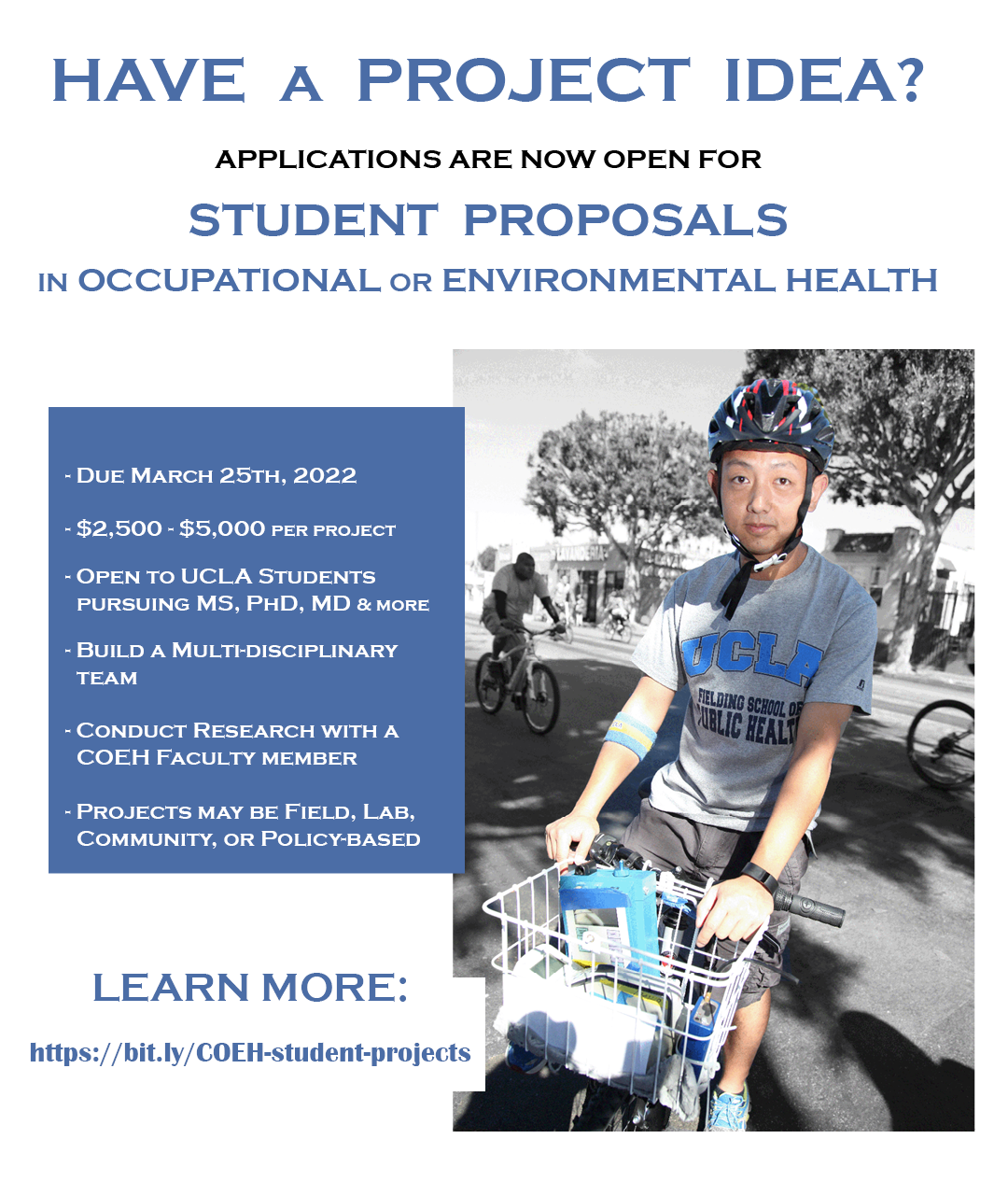Funding Opportunities

Applications are generally due Spring quarter.
Visit the Student Project page for details about this year’s opportunity, due March 25, 2022.
Student Project Awards
The UCLA Center for Occupational and Environmental Health (COEH) invites applications from UCLA MS and doctoral students who would like to conduct a year-long research project in occupational or environmental health. Teaching, service, community intervention, and policy projects will also be considered. The purpose is to encourage M.S. and doctoral students to work in teams with students from other disciplines in order to better address real-world problems.
Award Amount & Project Time Period
Short projects (minimum of one quarter): Up to $2,500 in funding for projects lasting at least one quarter.
Year-long projects: Up to $5,000 for projects beginning Spring 2022 and ending Spring 2023.
Eligibility
Competition is open to currently registered graduate students or medical residents (“students”) who will remain in active status for the entire academic year. One of the students’ faculty advisors must be either a COEH Faculty or Associate member. Reference our People page for a list of eligible faculty and associate advisors. Interdisciplinary projects are encouraged, but not required. Students are expected to meet with their faculty advisors on a regular basis to obtain input and keep them informed of their progress. Faculty advisors are expected to actively mentor the project and approve the final report
Southern California NIOSH Education and Research Center
Pilot Project Research Training Grant
Up to $10,000 Occupational Health and Safety Research Training Pilot Project Grants
The Southern California NIOSH Education and Research Center (ERC) announces the availability of awards for one-year pilot projects to support occupational health and safety research training for students (including ERC trainees), new investigators, and new junior faculty (within 6 years of initial appointment). Funding is provided for small research projects or pilot studies that aim to explore study feasibility, collect preliminary data, and/or enable investigators to seek external, longer-term funding. Applications need to address topics relevant to NORA research areas (https://www.cdc.gov/nora/default.html) including cross sector goals. Awards are not intended to support activities already funded by other research or training grants. Awards are contingent on receipt of funds from NIOSH. The program typically awards more than 50% of applicants and anticipates making at least five new awards of up to $10,000 (total cost) each. Proposals addressing occupational health or safety issues for vulnerable high-risk populations (e.g., low wage, immigrant, minority, older workers, or workers exposed to heat stress) are encouraged.
Students and young investigators are particularly encouraged to apply, and with all other factors equal, will receive funding priority. Non-faculty must have a full-time faculty member to sponsor their project. Faculty sponsors and students must be identified as such in the proposal. Projects involving human subjects should apply for human subject approval from their IRB at the earliest opportunity and attach their submitted human subject protocol to the research proposal. All pilot project grantees are required to submit quarterly progress reports and to present their research results, if selected, in the fall of the following year at an ERC-wide meeting. In addition, grantees are expected to present their research at a scientific conference and submit a manuscript based on their research results to a peer-reviewed journal.
Letter of Intent and Applications:
By April 11, 2022, submission of a one-page Letter of Intent describing the proposed project via email to Dr. Omid (nomid@ph.ucla.edu) and cc Dr. Robbins (wrobbins@sonnet.ucla.edu) and with a heading, ‘ERC pilot LOI.’ A CV of the applicant, and of the sponsoring faculty if the applicant is a student, should be submitted along with the letter of intent. By May 9, 2022, full applications are due as e-mailed MS Word documents. Final applications must include:
- Cover page with title, contact information, faculty sponsor if applicant is a trainee, NORA sector and occupational safety and health area(s) addressed by the proposal, and the status of IRB approval;
- Unstructured abstract of the proposal (maximal 250 words);
- Description of the project (3-6 pages, plus references);
- Human subjects protocol as draft or as submitted to local IRB;
- Budget and budget justification for a 12- to 15-month period ending no later than September 30, 2023;
- Bio-sketch (NIH format) of applicant (and faculty sponsor(s) if applicable), found here: https://grants.nih.gov/grants/forms/biosketch.htm.
Applications will be subjected to peer review. Awardees will be asked to respond to reviewers’ comments before a final decision is made. Funding may begin as early as July 1, 2022, or if human subjects are involved after IRB approval has been obtained. The primary review criteria are:
1) Relevance to workplace health and safety and NORA research areas
2) Scientific merit / methodological quality
3) Qualification of applicant, institutional environment, and feasibility
4) Stimulation of interdisciplinary research and translation into practice
5) Likelihood of resulting in publication in a peer-reviewed journal
6) Likelihood of leading to future external funding
7) Novelty of ideas, methods, or application in a new occupational context
8) Appropriateness of budget and evidence that the proposed work is not otherwise funded
For further information and to receive detailed application guidelines, please contact Dr. Negar Omid at 310-825-0709, nomid@ph.ucla.edu.
Please post and distribute to eligible individuals at your institution.
Employment Opportunities
We have no open positions at this time. Please sign up for our News & Events list to be the first to hear about new opportunities.
Image credit: Margaret Molloy for FSPH
